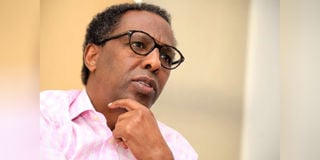Premium
Lawyer Ahmednasir sues Kenya for Sh200m

Lawyer Ahmednasir Abdullahi.
What you need to know:
- In his suit, he argues that the Supreme Court has unlawfully denied him audience based on a “judge-made offence” intended to stop the lawyer from publicly speaking about corruption in the Judiciary.
Lawyer Ahmednasir Abdullahi has sued Kenya at the East African Court of Justice, seeking to quash a Supreme Court ban against him, and demanding damages of Sh200 million for alleged violation of his right to fair administrative action.
In his suit, he argues that the Supreme Court has unlawfully denied him audience based on a “judge-made offence” intended to stop the lawyer from publicly speaking about corruption in the Judiciary.
Mr Abdullahi claims that the ban was imposed following an exchange of WhatsApp messages between a few members of the Supreme Court bench.
“The respondent State (Kenya) manipulated the law on contempt of court to achieve a result that favoured impunity and limited the applicant’s freedom of expression. He argues that the Justices of the Supreme Court do not have any powers to punish the applicant for the social media posts, media interviews and write-ups that allegedly damage the reputation of the justices of the Supreme Court and the judges who have served thereon over the years…,” Mr Abdullahi says in court papers.
The Sh200 million bill Mr Abdullahi wants taxpayers to foot is allegedly legal fees the lawyer would have earned in cases he was hired to represent clients, and which are pending determination at the Supreme Court.
“…That this honourable court be pleased to award damages of Sh200,000,000 or other sums to the applicant being the fees that the applicant forfeited for cases he had to conduct before the Supreme Court,” Mr Abdullahi adds.
He claims that the top judges have manipulated laws on contempt of court to unlawfully ban him from appearing before the Supreme Court.
Mr Abdullahi wants the East African Court to issue orders finding that Kenya was at fault in the Supreme Court ban, and that the judges denied him his right to fair administrative action, right access to justice and right to work.
On January 18, all seven Supreme Court judges – Chief Justice Martha Koome, her deputy Philomena Mwilu, Mohamed Ibrahim, Smokin Wanjala, Njoki Ndung’u, Isaac Lenaola and William Ouko – declined to hear a land case involving former President Daniel Moi and a widow.
Mr Abdullahi represents Susan Chelugui, widow of former Chief David Chelugui. The Supreme Court judges declined to hear that, or any matter, in which Mr Abdullahi and advocates from his law firm represent a party.
On the same day, Supreme Court registrar Letizia Wachira wrote to Mr Abdullahi stating that all Apex judges had resolved to deny him an audience on account of repeated attacks against them in the press and social media posts.
The lawyer holds that there are no rules allowing a pre-hearing conference such as the one allegedly held by Supreme Court judges before declining to hear the case on January 18.
In the East African Court of Justice suit, Mr Abdullahi maintains that his social media postings and press appearances addressing corruption in the Supreme Court were fair comments on matters of public interest.
The lawyer makes further bribery allegations against unnamed Supreme Court judges, claiming that they received money in an attempt to influence the 2022 Presidential petition filed by Raila Odinga and other individuals, challenging President William Ruto’s victory.
“The action taken by the respondent State (Kenya) to ban the applicant (Mr Abdullahi) from practising before the Supreme Court of Kenya for an unspecified period, amounts to an arbitrary action that is not anchored in any provision of formal law that regulates the practice of law in Kenya which must be accessible and precise and must comply with the substantive requirements imposed by the rule of law and the principle of legality,” Mr Abdullahi’s lawyers MMA Advocates say in court papers.
In banning Mr Abdullahi, the Supreme Court judges said that the lawyer had failed to heed prior warnings against attacking the Judiciary and its officers.





